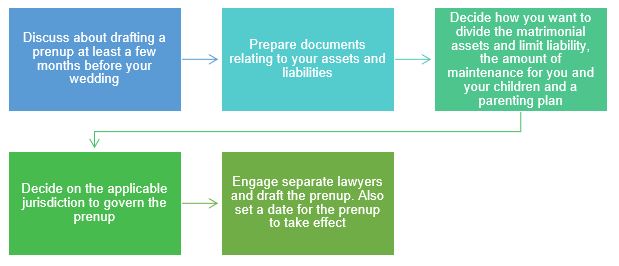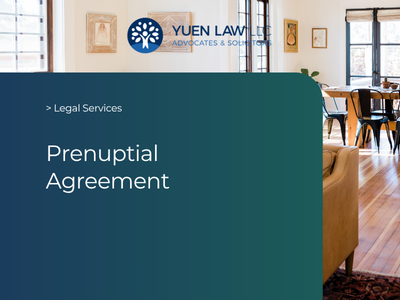Table of Contents

How the Singapore Courts Views Prenuptial Agreements
The enforceability of prenuptial agreements in Singapore has been subject to misconceptions, partly due to a 1992 case where the court appeared to suggest that these agreements might not be upheld, as they could conflict with public policy and the provisions of the Women’s Charter, which governs marriages in Singapore.
However, much of what the Court said has to be read in context and on closer reading, prenuptial agreements are only unenforceable in situations where the couple included a clause stipulating that another ceremony would be essential before married life can commence. It is therefore not a blanket rule that all prenuptial agreements are unenforceable.
In fact, Courts would more often than not find that certain clauses in the prenuptial agreement is unenforceable (if any), rather than render the entire agreement void, depending on the specific facts and circumstances surrounding the particular case.
Any misconceptions on the enforceability of prenuptial agreements in Singapore was clarified in the landmark case of TQ v TR, particularly the principles to be applied when determining the effect of a prenuptial agreement on the division of matrimonial assets. As a starting point for analysing the legal status of prenuptial agreements, courts will look at the interplay of the common law and the statute, specifically the Women’s Charter.
While the Court did warn that not all prenuptial agreements will be upheld and enforced, courts are still prepared to give effect to prenuptial agreements as long as they satisfy the basic requirements of a legal contract, are not obtained through fraudulent means and are in line with legal principles and public policies.
What is a Prenuptial Agreement?
As the term “pre” suggests, prenuptial agreements are signed by couples before they get married. These written agreements are designed to outline the terms and conditions that will apply if the couple later decides to divorce.
From a practical standpoint, prenuptial agreements act as a form of insurance, giving couples clarity and certainty about their rights concerning how assets and property are divided, maintenance, and matters involving children in the unfortunate event of a divorce.
Couples can also use the prenuptial agreement to ringfence assets that one or both of them bring to the marriage. This can include inheritance, of cash or property gifts from parents.
Clauses in a Prenuptial Agreement
Typically, prenuptial agreements include clauses to clarify each spouse’s rights regarding custody, maintenance, and property matters—often referred to as ancillary matters. These agreements aim to set expectations and establish a framework that can help reduce potential disputes by defining how key issues will be handled should the marriage end or face significant changes.
Property Ownership and Division
Couples specify property ownership during the marriage and outline how assets will be divided in cases of divorce, separation, or the death of a spouse.
Spousal and Child Maintenance
Agreements detail any maintenance obligations for the wife and children in the event of a divorce, ensuring clarity on financial support.
Debt Responsibility
Provisions define how liabilities are to be managed and shared between spouses, providing transparency around financial responsibilities.
Child Custody and Parenting Arrangements
Plans for custody, care, and visitation rights are set out to support a stable environment for the children.
Distribution of Individual Assets Upon Death
Couples address how a spouse’s individual assets will be distributed if they pass away during the marriage, safeguarding each partner’s intentions for their personal property.
Inheritances and Gifts
Terms include how inheritances and gifts—whether received or anticipated—will be treated within the marriage.
Insurance Coverage
Adequate life, medical, and disability insurance arrangements are typically outlined to ensure both parties’ protection.
Governing Law
Finally, for couples married abroad or with international ties, specifying the governing law of the agreement is essential, particularly given the rising number of Singaporeans marrying foreigners.
By covering these critical areas, prenuptial agreements help couples navigate complex personal and financial responsibilities, offering peace of mind and legal certainty throughout the marriage.
Drafting a Nuptial Agreement
Now think of this scenario: You and your boyfriend are thinking of getting married, but not till much later when you both are in your mid-thirties, as that is when both of your careers are more or less on track and are more financially stable to start a family.
Choosing which type of nuptial agreement to draft will depend on which stage of the marriage you are in. While it used to be more common for couples where one of whom is a foreigner or who have a great disparity in wealth to draft nuptial agreements, there is an increasing number of couples who want to draft such agreements as they are getting married later and accumulating more wealth before they do so; it is likely that some would want to protect their wealth and rights in a marriage, not because they do not trust each other, but because they simply want added security and to prepare themselves for the worst.
While it is possible to draft a pre or postnuptial agreement yourself, it would be best if you and your spouse were to engage an experienced lawyer to do so for you. This is because there may be some technicalities that may be too complex (especially if there are a lot of ancillary matters to be discussed), and there are certain provisions in the Women’s Charter and policies that you have to adhere to or risk having your nuptial agreements set aside by the court.
The idea of drafting a pre or postnuptial can be daunting, so here is a summary of the things you need to take note of:

Pros and Cons of a Prenuptial Agreement
Prenuptial agreements mainly serve to protect spouses relating to the matters discussed above. Further, such agreements could serve as a starting point for negotiations in divorce proceedings, potentially speed up the divorce proceedings and to guide the court in coming to a fair and just decision, assuming that the prenuptial agreement is valid and enforceable in court.
However, it is important to bear in mind that the court is the final arbiter of the law and it is not necessary that the final divorce judgment order will be the same as the prenuptial agreement.
Division of Matrimonial Assets
In particular for the division of matrimonial assets, the governing provision is s112 of the Women’s Charter which gives the Court the power to order the division of matrimonial assets in a way that it thinks is just and equitable.
Custody of Children
Further, for the custody of children, there is a presumption that prenuptial agreements are unenforceable unless it is shown that the agreements are drafted in the best interests of the children.
Emotional Considerations
Some couples may also view the idea of drafting prenuptial agreements as a taboo topic because it is associated with an unhappy ending. The party bringing up the idea may also be viewed as less trusting and more defensive and this may potentially be a trigger point for a less harmonious marriage as parties start drawing clear boundaries when drafting such agreements.
Enforcability of Prenuptial Agreements Decided Before the Court
Despite the advantages of prenuptial agreements, drafting such agreements is less common in Singapore because they may not be as strictly enforced as in other jurisdictions such as the United States or Australia because their enforceability in Singapore depends on whether the Court deems it valid. Prenuptial agreements are therefore not in and of themselves enforceable.
What Exactly is a Postnuptial Agreement?
If there are agreements entered into before marriage, it follows that there are agreements entered into after a marriage, and hence the prefix “post”.
A postnuptial agreement is typically drafted to provide for what should happen in the event of a separation, divorce or death of a spouse.
Typically, the kind of clauses that are included in a postnuptial agreement is the same as that of a prenuptial agreement. The advantages and disadvantages associated with prenuptial agreements are similar to that of postnuptial agreements. But in addition, postnuptial agreements are also useful if parties want to protect their assets when there happens to be a material change in circumstances during the marriage. For the sake of clarity, the subsequent paragraphs seek to clarify the common confusion people may have between postnuptial agreements and other legal documents.
Differences Between a Prenuptial Agreement and Postnuptial Agreement
The main difference is when the two types of agreements are entered into, whether it is before or after the marriage.
Courts will tend to give more weight to postnuptial agreements due to the different circumstances in which they were made in. This is because postnuptial agreements reflect parties’ more recent intentions towards their marriage and are drafted when they have a clearer understanding of the implications of such an agreement and their responsibilities in the marriage.
Differences Between a Postnuptial Agreement and Deed of Separation
Postnuptial agreements can be entered into even when there are no signs of a breakdown of the marriage, and couples just want an added security, whereas deeds of separation are entered into when parties wish to separate or to meet the prerequisite for filing for divorce on the ground of 3 years’ separation.
Another distinction is that postnuptial agreements are not automatically binding as the court will still retain the power to determine whether such agreements are valid and enforceable, while deeds of separation are automatically binding when signed by both parties.
Postnuptial Agreements VS Wills – When are They Used?
In short, postnuptial agreements only involve matters relating to the rights of the parties in the marriage and is an agreement between them whereas wills can affect parties other than those in the marriage.
FAQs
The nuptial agreement will be governed by the jurisdictional law chosen by the couple. If it is not expressly stated in the agreement, the agreement will have to be construed to determine whether any clauses expressly or impliedly refer to the choice of governing law.
If the nuptial agreement is governed by a foreign law, and assuming that the foreign law is not in conflict with Singapore’s public policy, the Singapore court is ready to give significant weight to the terms of that agreement if that agreement is valid and enforceable under that foreign law.
There is no magic formula to this but a few months prior to the wedding is preferable. This is to prevent undue stress on either party.
It is unlikely that you can modify your prenuptial agreement after the marriage. However, what you can do is to draft a postnuptial agreement to reflect any change in circumstances there maybe during the marriage.
However, do note that if no prenuptial agreement was drafted and a number of years have passed since you and your spouse got married before you decide to draft a postnuptial agreement, any assets acquired during those number of years of marriage will be considered martial property and the process to draft the postnuptial agreement may get more complex.


